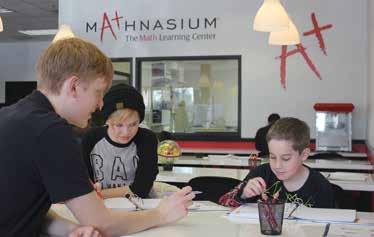Canyon Creek Kids
Will My Child Finish
the School Year Strong in Math?
•
by Julie Haba, Mathnasium Director
C
ounting, wholes and parts, and proportional thinking are the underlying elements that create the entire mathematics curriculum. Students who are sound in these fundamentals will finish strong. Intertwined with all three basic elements is number sense: having an intuitive sense of the problem, being able to visualize how the numbers relate and how they can be manipulated.
•
Whether your child is above, below, or at grade-level, the key to understanding math is number sense.
•
How do I know if my child has number sense or may need extra support in math? •
Has the student’s attitude changed? Those who formally loved learning and were successful may become bored with math, attempt to just “get it over with”, insist that they don’t like math, or state “I’m not good at math anyway.” These are usually symptoms of frustration, and early signs that the student needs help strengthening the foundational and advanced skills
Math Help
Math Enrichment
Test Prep
Homework Help
We make math make sense.
Call us today for a free trial! Exp. 8/31/2015
Mathnasium of Coit Campbell
972-231-MATH (6284) mathnasium.com/coitcampbell
necessary for success in the mathematics classroom. Children, and adults, don’t hate math, they do hate being confused, bewildered, embarrassed, and intimidated by math. As kids tell us over and over again, “When I get it, it’s fun, it’s cool.” Their math grades are lagging, but the student puts forth effort and has good grades in other subjects. There also may be a comment from a child’s teacher about “not working up to his or her full potential.” Alternatively, you may notice that your “A” math student has the facts and processes down, yet, lacks common sense in relation to numbers in real life, and may not be able to determine whether or not an answer is reasonable. A child with strong number sense will correct most initial mistakes when they notice their answer “doesn’t make sense.” Physical habits you should look for are counting on fingers or using tally marks; this behavior suggests poor retention of number facts. These dependencies will make addition and subtraction more difficult. The students will constantly be counting one too many or too few, and not internalize the number facts, which makes learning the subsequent multiplication and division facts even more complicated. Try asking them the appropriate (first grade through early high school) mental math questions below. These should be answered without pencil and paper. This will give you a good idea regarding whether or not they are on track for their grade level. Even excellent students will have gaps in understanding the meaning of math, which will eventually show up in their grades and standardized testing.
Number sense doesn’t develop overnight or by accident. It is the result of a long-term process of interaction with a specific set of concepts and skills presented in a way that makes sense to the learner. With number sense, problem-solving becomes second nature and enjoyable. Build number sense and you develop a deep understanding and life-long love of math.








